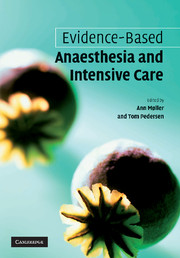Book contents
- Frontmatter
- Contents
- Foreword
- Contributors
- 1 Introducing evidence-based anaesthesia
- 2 How to define the questions
- 3 Developing a search strategy, locating studies and electronic databases
- 4 Retrieving the data
- 5 Critical appraisal and presentation of study details
- 6 Outcomes
- 7 The meta-analysis of a systematic review
- 8 Bias in systematic reviews: considerations when updating your knowledge
- 9 The Cochrane Collaboration and the Cochrane Anaesthesia Review Group
- 10 Integrating clinical practice and evidence: how to learn and teach evidence-based medicine
- 11 Involving patients and consumers in health care and decision-making processes: nothing about us without us
- 12 Evidence-based medicine in the Third World
- 13 Preoperative anaesthesia evaluation
- 14 Regional anaesthesia versus general anaesthesia
- 15 Fluid therapy
- 16 Antiemetics
- 17 Anaesthesia for day-case surgery
- 18 Obstetrical anaesthesia
- 19 Anaesthesia for major abdominal and urological surgery
- 20 Anaesthesia for paediatric surgery
- 21 Anaesthesia for eye, ENT and dental surgery
- 22 Anaesthesia for neurosurgery
- 23 Cardiothoracic anaesthesia and critical care
- 24 Postoperative pain therapy
- 25 Critical care medicine
- 26 Emergency medicine: cardiac arrest management, severe burns, near-drowning and multiple trauma
- Glossary of terms
- Index
23 - Cardiothoracic anaesthesia and critical care
Published online by Cambridge University Press: 05 September 2009
- Frontmatter
- Contents
- Foreword
- Contributors
- 1 Introducing evidence-based anaesthesia
- 2 How to define the questions
- 3 Developing a search strategy, locating studies and electronic databases
- 4 Retrieving the data
- 5 Critical appraisal and presentation of study details
- 6 Outcomes
- 7 The meta-analysis of a systematic review
- 8 Bias in systematic reviews: considerations when updating your knowledge
- 9 The Cochrane Collaboration and the Cochrane Anaesthesia Review Group
- 10 Integrating clinical practice and evidence: how to learn and teach evidence-based medicine
- 11 Involving patients and consumers in health care and decision-making processes: nothing about us without us
- 12 Evidence-based medicine in the Third World
- 13 Preoperative anaesthesia evaluation
- 14 Regional anaesthesia versus general anaesthesia
- 15 Fluid therapy
- 16 Antiemetics
- 17 Anaesthesia for day-case surgery
- 18 Obstetrical anaesthesia
- 19 Anaesthesia for major abdominal and urological surgery
- 20 Anaesthesia for paediatric surgery
- 21 Anaesthesia for eye, ENT and dental surgery
- 22 Anaesthesia for neurosurgery
- 23 Cardiothoracic anaesthesia and critical care
- 24 Postoperative pain therapy
- 25 Critical care medicine
- 26 Emergency medicine: cardiac arrest management, severe burns, near-drowning and multiple trauma
- Glossary of terms
- Index
Summary
Much of the practice of cardiothoracic anaesthesia and critical care developed without an evidence base. However, in recent years there have been an increasing number of randomised controlled trials (RCTs). In some areas their findings have been inconclusive often because their sample size has been too small. Where there are a sufficient number of such studies, some areas of research have been subjected to meta-analysis. Some of these have been inconclusive because of a lack of good quality studies upon which to base them. Others, such as atrial fibrillation (AF) prophylaxis, have clearly identified efficacious therapy yet they have been found to have no influence on important clinical outcomes. Remarkably, there are yet others that have been ignored whilst researchers continue to undertake trials to establish the veracity of that which is already known, as is the case with aprotinin to reduce blood loss and transfusion. Finally, there are those, such as the use of epidural analgesia, where meta-analysis has informed us of its efficacy in reducing complications but do not and can never answer the key question “What is the incidence of epidural haematoma”? However, whilst the literature on evidence practice is steadily increasing, the great majority of cardiothoracic anaesthesia and critical care remains without any.
Keywords
- Type
- Chapter
- Information
- Evidence-based Anaesthesia and Intensive Care , pp. 293 - 306Publisher: Cambridge University PressPrint publication year: 2006
- 1
- Cited by

